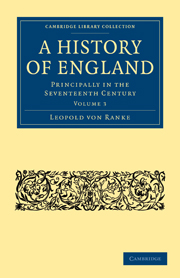Book contents
- Frontmatter
- Contents
- BOOK XI THE COMMONWEALTH IN ENGLAND, 1649—1653
- BOOK XII THE PROTECTORATE OF OLIVER CROMWELL, 1653–1658
- BOOK XIII FALL OF THE PROTECTORATE AND THE COMMONWEALTH. RESTORATION OF THE MONARCHY, 1658—1660
- INTRODUCTION
- CHAP. I Attempt to continue the Protectorate
- CHAP. II Attempt to form a Commonwealth on a new basis
- CHAP. III Royalist movements in the summer of 1659
- CHAP. IV Supremacy and constitutional projects of the Army
- CHAP. V Lambert and Monk. Restoration of the Rump Parliament
- CHAP. VI Anti-republican movement. Monk in the City
- CHAP. VII Recall of the King
- BOOK XIV THE FIRST FIVE YEARS UNDER CHARLES II. THE RESTORATION OF THE ANGLICAN CHURCH
- BOOK XV THE DUTCH WARS OF CHARLES II. ESTABLISHMENT OF THE PROTESTANT AND PARLIAMENTARY CHARACTER OF THE CONSTITUTION 1664—1674
CHAP. I - Attempt to continue the Protectorate
Published online by Cambridge University Press: 07 June 2011
- Frontmatter
- Contents
- BOOK XI THE COMMONWEALTH IN ENGLAND, 1649—1653
- BOOK XII THE PROTECTORATE OF OLIVER CROMWELL, 1653–1658
- BOOK XIII FALL OF THE PROTECTORATE AND THE COMMONWEALTH. RESTORATION OF THE MONARCHY, 1658—1660
- INTRODUCTION
- CHAP. I Attempt to continue the Protectorate
- CHAP. II Attempt to form a Commonwealth on a new basis
- CHAP. III Royalist movements in the summer of 1659
- CHAP. IV Supremacy and constitutional projects of the Army
- CHAP. V Lambert and Monk. Restoration of the Rump Parliament
- CHAP. VI Anti-republican movement. Monk in the City
- CHAP. VII Recall of the King
- BOOK XIV THE FIRST FIVE YEARS UNDER CHARLES II. THE RESTORATION OF THE ANGLICAN CHURCH
- BOOK XV THE DUTCH WARS OF CHARLES II. ESTABLISHMENT OF THE PROTESTANT AND PARLIAMENTARY CHARACTER OF THE CONSTITUTION 1664—1674
Summary
A great statesman can never be properly estimated by his contemporaries. They are easily blinded by his brilliancy, or else they feel his proximity and the conditions of his rule to be oppressive. Cromwell, like most extraordinary men, died little known, and hated rather than loved. The world saw only the darker side of his career.
Subsequent generations can appreciate the advantage which English trade has gained through Cromwell's West Indian conquests. The mercantile class of the day merely observed that great immediate losses had followed from the rupture with Spain. They counted up the number of merchant-vessels that had thus been destroyed and the millions of pounds that their cargoes were worth. Cromwell had forced the Dutch, however unwillingly, to attach themselves to him in general matters of policy, and thus early indicated the attitude which after many interruptions has been finally accepted. But it was reserved for later history to appreciate this. His contemporaries regarded the Dutch above all as rivals, and as secret or open enemies. They disliked the treaty made with them, and ignored the Navigation Act, which was in their own favour. Cromwell's home-administration was even more loudly blamed. In those points which had caused the rupture with Charles I he had afforded even stronger ground of complaint, he had openly collected taxes on his own authority, had again and again dissolved Parliaments of the most different kind, had been guilty of insolent encroachments upon the course of justice and personal liberty.
- Type
- Chapter
- Information
- A History of EnglandPrincipally in the Seventeenth Century, pp. 222 - 233Publisher: Cambridge University PressPrint publication year: 2010First published in: 1875

